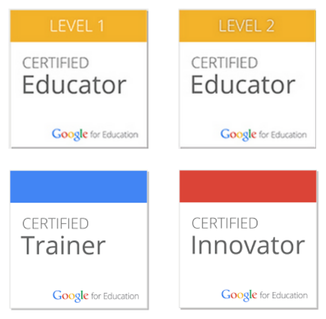Tech Specialist Certifications - What are they and why do we need them?
 |
| Image property of and downloaded from ENISA |
I have been working in technology for all of my adult life. I have been a graphic designer, web site designer and developer, and animator before becoming an educator. Those job descriptions require undergraduate degrees as well as professional certifications in various applications and media in order to make a professional marketable. I hold professional certifications in Adobe Creative Suite, Quark XPress, Mac OS, and Font Management, as well as Microsoft Office.
But I am now an educator in technology. In addition to my professional experience, degrees and certifications in the technologies used in my previous career, I also require relevant certifications to my career as a technology educator. In addition to my 2 Masters degrees in Education and Educational Technology, I also have a Graduate Certificate of Advanced Studies in Internet Programming and I currently hold professional certifications in the Blackboard online teaching environment and as a Microsoft Office Specialist, both of which are required for my part time position as an adjunct instructor at Triton College. There are many more to work toward in both the K-12 and higher education arenas, and here are some evaluations of a few that are of interest to me:
 |
| Image property of ISTE and downloaded from prweb.com |
International Society for Technology in Education (ISTE) Educator
This is a brand new certification is being offered through this internationally recognized technology education standards organization, and these standards are the ones I currently teach to in my position as a junior high coding teacher. Being offered for the first time in 2018-2019 at a cost of $750, training requires 30 hours of training including creating and teaching lessons specifically geared toward the 7 ISTE Standards for Students over a 6 month period. Individual membership in ISTE for educators is $125 per year and includes access to many educator materials and lesson plans but does not include any certification. I have missed the window for participating this year but it may be something I try to pursue next year.
 |
| Images property of Google and downloaded from Education, Technology and Everything In Between |
Google Certified Educator, Trainer, & Innovator
Being a teacher in a district that uses Chromebooks and Google Apps on a regular basis this certification is directly relevant to my current position. There are 4 levels of Google Educator: Level 1, Level 2, Certified Trainer, and Certified Innovator. I use Google Classroom and Google Docs daily already, and after looking at the exercises for becoming a Level 1 Educator, I feel I already have these skills in hand, so getting this certification should be a no-brainer for me, and after the free training the exam is only $10. Per Google's own description, Level 2 is for "super users" of Google Apps for Education, so achieving this one is a more desirable goal for me, and after more free training this exam is $25. I eventually would like to pursue the Certified Trainer and Certified Innovator because I see myself in a technology coach role eventually in my educator career. Both of these titles require creating training videos and conducting case studies over a period of time, and there may be annual renewal fees and even "tuition" for ongoing training, fees for which were not given without actually beginning the application process, and of course are subject to change.
 |
| Image property of Apple and downloaded from SDW Tech Integration Now |
Apple Teacher & Distinguished Educator
Similar to Google and their training for specific apps, Apple offers training for teachers to use their suite of apps for both iPads and Macintosh desktops and laptop. The process for Apple Teacher seems to be more geared toward professional development credits for groups of teachers rather than an actual certification for individual educators. If training individually it appears to be free to sign up and take tutorials on your own. If pursuing a higher level of becoming an Apple Distinguished Educator who can train other teachers in group settings, training is available through EdTechTeam: online seminars are $149, in-person workshops are $199, and signing up for conferences is $249 with possible group, early-bird and hosting discounts available. In my previous district where I taught K-5 STEM, we were also a Google district in grades 3-8, but in K-2 students learned on iPads and Macs, so knowing that there is the possibility of needing knowledge in both Google and Apple ed tech in the same district would make this possibility intriguing for me.
| Image property of Microsoft and downloaded from ClipArtMax |
Microsoft Certified Educator
At first glance this program seems to be geared more toward high school since Microsoft products tend to be more widely used in the professional world, the one student will see after graduation and moving on to either college or the work place. Per the Microsoft Certified Educator information page, this certification is "ideal for educators-in-training, faculty of teacher training colleges, and in-service educators". I gather from this that this program prepares teachers to teach specific Microsoft products rather than how to use tech products to facilitate learning across disciplines, which is what I gathered about Google's and Apple's educator programs. Given that my current district is using Google products regularly more so than Microsoft products, and that I am already a Microsoft Office Specialist, this certification seems redundant for me and unnecessary. Taking the training course is free online, and taking the certification exam through Certiport is $127 for licensed educators.
 |
| Image property of and downloaded from Common Sense Media |
Common Sense Educator
Common Sense Media provides many free lesson plans for teachers in the field of computer science literacy and digital citizenship, as well as being a resource for parents and teachers on the latest trends in media and reviews of the games, movies, TV shows and websites children are exposed to. I have used many of their lesson plans in the past at the K-5 level in my previous district. Training to become a Common Sense Educator is free and mostly consists of performing a series of specific educator tasks such as attending an in-person or online introductory seminar, teaching lessons from their website, publishing an original lesson plan to their website for other teachers to share, reviewing one of their already published lessons, and then writing a reflection. Completing all the necessary requirements seems like something I can easily accomplish, I just need to put in the time.
I am currently working on my Google Educator and Common Sense Media Educator certifications. Google Educator is most relevant in my current full time position as a junior high technology teacher in a Google school district. I use many Common Sense Media lesson plan ideas and look to that site for guidance regularly. Beyond those Apple Educator seems like the next goal since being a former graphic designer who uses a Macintosh regularly at home for professional purposes, the familiarity lends itself to be something I would pick up quickly. Microsoft Educator might also be something worthwhile since I am already a Microsoft Office Specialist, but not in the immediate future because of my current position in a junior high - this one seems more suited for a high school setting. As far as ISTE goes, it would not hurt my credentials to be certified in internationally recognized technology educator standards if I could get into their program next year. There are many more besides these listed here, and the list is growing all the time. It just goes to show that as technology changes, so does the need to adapt and stay relevant. We teachers never seem to be done with our need to stay current with our education so that the education we give to our students is also as current as possible.


Comments
Post a Comment